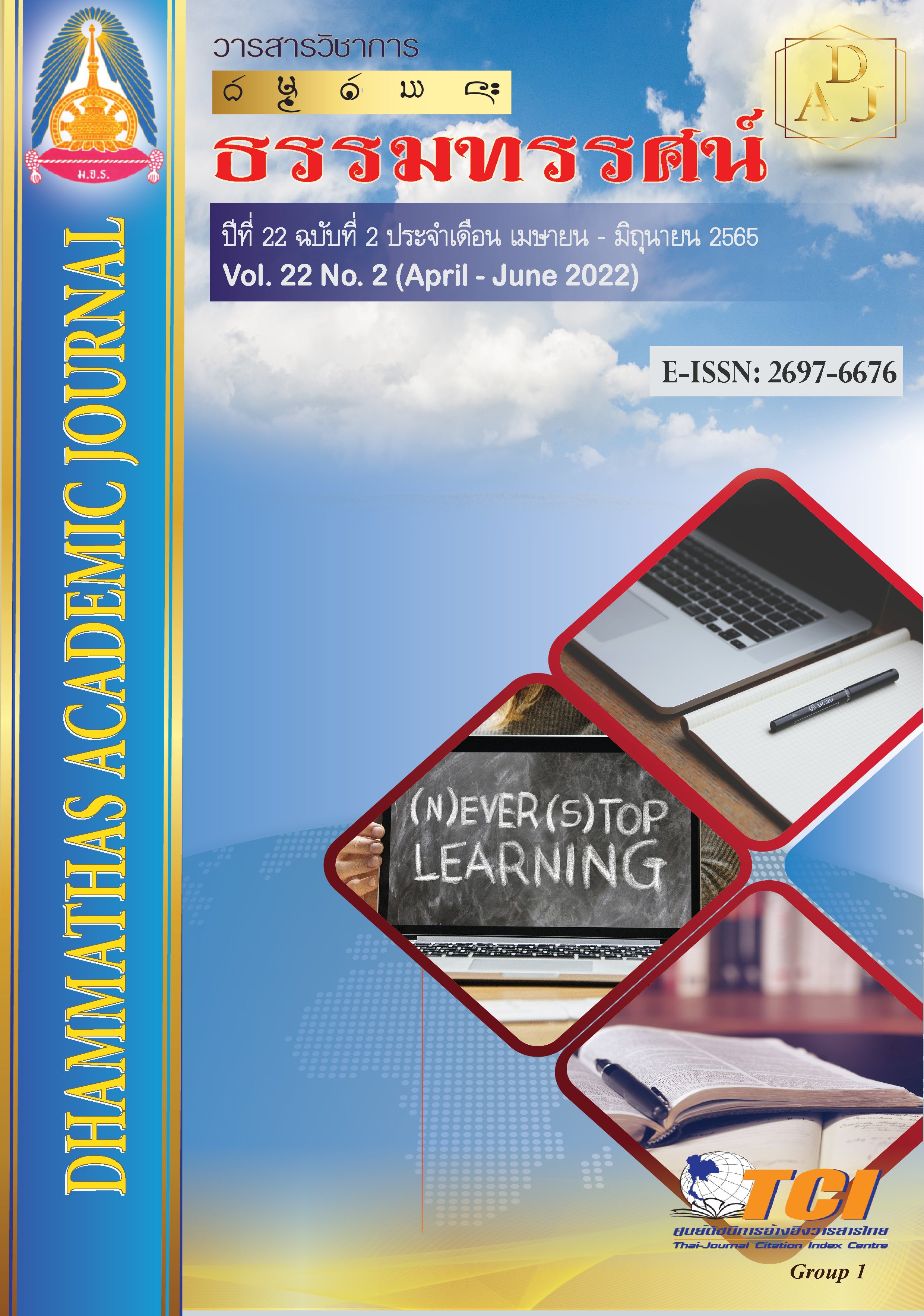Satisfaction of Undergraduate Students towards Online Teaching, Mahachulalongkornrajavidyalaya University Khon Kaen Campus
Main Article Content
Abstract
This study aimed to examine satisfaction of undergraduate students towards online teaching to compare student satisfaction of the online teaching approach and study the guideline in development of online learning at Mahachulalongkornrajavidyalaya University Khon Kaen Campus. This study was carried out by means of the mixed method research to collect the data from 262 undergraduate students at Mahachulalongkornrajavidyalaya University Khon Kaen Campus, and eight key informants. The tools used in this study were survey form and interview form. Statistics used in this study were frequency, percentage, mean, and standard deviation. T-test and F-test were also used.
The study found that:
1. The undergraduate students’ overall satisfaction with the online teaching at Mahachulalongkornrajavidyalaya University Khon Kaen Campus was high, with learning activities being rated the highest, while the teacher, learning assessment and learning factors were rated high.
2. Students with different age, gender and year did not have different level of satisfaction. On the other hand, students with different programs had different online learning satisfaction level with statistical significance of 0.05.
3. The guideline for development of online teaching at MahachulalongKornrajavidyalaya University Khon Kaen Campus was that the atmosphere should be relaxed enough that the students were encouraged to express their minds. There should be activities that stimulated the students to find answers. The learning activities should follow the teaching plan. Appropriate media should be used in class, and there should be assessment after the class.
Article Details

This work is licensed under a Creative Commons Attribution-NonCommercial-NoDerivatives 4.0 International License.
เพื่อให้เป็นไปตามกฎหมายลิขสิทธิ์ ผู้นิพนธ์ทุกท่านต้องลงลายมือชื่อในแบบฟอร์มใบมอบลิขสิทธิ์บทความ ให้แก่วารสารฯ พร้อมกับบทความต้นฉบับที่ได้แก้ไขครั้งสุดท้าย นอกจากนี้ ผู้นิพนธ์ทุกท่านต้องยืนยันว่าบทความ ต้นฉบับที่ส่งมาตีพิมพ์นั้น ได้ส่งมาตีพิมพ์เฉพาะในวารสาร วิชาการธรรม ทรรศน์ เพียงแห่งเดียวเท่านั้น หากมีการใช้ ภาพหรือตารางของผู้นิพนธ์อื่นที่ปรากฏในสิ่งตีพิมพ์อื่นมาแล้ว ผู้นิพนธ์ต้องขออนุญาตเจ้าของลิขสิทธิ์ก่อน พร้อมทั้ง แสดงหนังสือที่ได้รับการยินยอมต่อบรรณาธิการ ก่อนที่บทความจะได้รับการตีพิมพ์References
กระทรวงการอุดมศึกษา วิทยาศาสตร์ วิจัยแลนวัตกรรม. (2564). มาตรการและการเฝ้าระวังการระบาดของโรคติดเชื่อไวรัสโคโรนา 2019. เข้าถึงได้จาก https://www.mhesi.go.th/images/Pusit2021/pdfs/CCF_000006.pdf
เฉลิมชัย เลี้ยงสกุล. (2563). การศึกษาในยุค COVID-19. กรุงเทพฯ: วิทยาลัยเสนาธิการทหาร.
นันทวิช เหล่าวิชยา. (2559). ความคาดหวังและความพึงพอใจนักศึกษาในเขตกรุงเทพมหานครและปริมณฑล : กรณีศึกษาการเรียนการสอนแบบดั้งเดิมและการเรียนการสอนแบบออนไลน์. ว.มรม. (มนุษยศาสตร์และสังคมศาสตร์), 10(1), 47-54.
มหาวิทยาลัยมหาจุฬาลงกรณราชวิทยาลัย วิทยาเขตขอนแก่น. (2564). ประกาศวิทยาลัยสงฆ์ขอนแก่น เรื่องปรับเปลี่ยนรูปแบบการจัดการเรียนการสอนให้สอดคล้องกับสถานการณ์การแพร่ระบาดของโรคติดเชื้อไวรัสโคโรนา 2019 (COVID-2019). เข้าถึงได้จาก https://www.facebook.com/ groups/985601488146712
ฝ่ายทะเบียนและวัดผล สำนักวิชาการ วิทยาเขตขอนแก่น. (2564). สถิตินิสิตมหาวิทยาลัยมหาจุฬาลงกรณราชวิทยาลัย วิทยาเขตขอนแก่น ปีการศึกษา 2564. ขอนแก่น: สำนักวิชาการ วิทยาเขตขอนแก่น
อนันศักดิ์ พวงอก. (2560). การศึกษาความพึงพอใจของอาจารย์และนักศึกษาคณะมนุษยศาสตร์และสังคมศาสตร์ มหาวิทยาลัยราชภัฏศรีสะเกษต่อการเรียนการสอนผ่านระบบการเรียนอีเลิร์นนิ่ง (E-Learning). วารสารวิชาการมนุษย์และสังคม มหาวิทยาลัยราชภัฏศรีสะเกษ, 1(1), 43-62.
อภิรดี นันท์ศุภวัฒน์ และเรมวล นันศุภวัฒน์. (2556). ความพึงพอในและผลลัพธ์ของการจัดการเรียนการสอนแบบผสมผสานในกระบวนวิชาภาวะผู้นำและการจัดการทางการพยาบาล. พยาบาลสาร มหาวิทยาลัยเชียงใหม่, 40(ฉบับพิเศษ), 47-60.
อรรถวิท ชังคมานนท์ และก่องกาญจน์ ดุลยไฃยม. (2560). การพัฒนารูปแบบทางเลือกสำหรับอีเลิรน์นิ่งในยุคสังคมออนไลน์. วารสารวิชาการมหาวิทยาลัยฟาร์อีสเทอร์น, 11(ฉบับพิเศษ), 44.
อรวรรณ ธนูศร. (2562). ความพึงพอใจของนิสิตต่อการจัดการเรียนการสอนหลักสูตรการศึกษาบัณฑิต สาขาวิทยาศาสตร์และคณิตศาสตร์ มหาวิทยาลัยทักษิณ. (รายงานวิจัย). พัทลุง: คณะวิทยาศาสตร์ มหาวิทยาลัยทักษิณ.
Yamane, T. (1967). Elementary Sampling Theory. New Jersey: Prentice-Hall.Inc.

